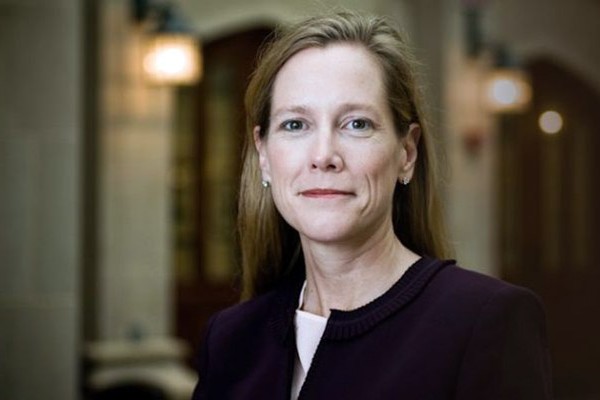WashU Expert: No quick fix to shortening gender pay gap
President Barack Obama recently announced new rules aimed at encouraging companies to provide salary information by workers’ race, gender and ethnicity. While obtaining good data is a necessary step in helping to shrink the gender pay gap, it will only be a starting point, said Hillary Sale, an expert on corporate governance and women’s leadership.
Board diversity a ‘significant opportunity’ for corporations
The number of women and minorities on corporate boards has remained static in the last 10 years, despite an increasing amount of data supporting the argument that board diversity is related to good business outcomes. “Businesses have a significant opportunity to improve performance through increasing the diversity – in many forms – of their board,” said Hillary Sale, JD, corporate governance expert and professor of law and management at Washington University in St. Louis. Sale offers thoughts for both corporations and potential board candidates.
Corporate political spending must be disclosed, says securities law expert
Investors are highly interested in information regarding corporate political spending, says Hillary Sale, JD, securities and corporate governance expert and the Walter D. Coles Professor of Law at Washington University in St. Louis. “The SEC should address the need for transparency in political spending to better inform shareholders and allow them to protect themselves from hidden political agendas in corporate campaign spending,” she says.
What happens in the boardroom doesn’t stay in the boardroom
Corporate governance has been in the forefront of public debate lately, thanks to such high-profile events as options backdating, the awarding of inflated CEO compensation packages and efforts to augment shareholder empowerment. These larger scandals have implications that reach beyond the boardroom into every aspect of an enterprise. Ultimately, the transgressions take their toll on all of society, according to Stuart Greenbaum, former dean of the business school at Washington University in St. Louis.
Options backdating is part of a tradition of boosting executive pay by bending the rules.
Managers can find way to increase their compensation.Now that the U.S. Senate Finance Committee has returned from its summer holiday, members have put the recent spate of backdating stock options at the top of the agenda. Over the summer, several companies have been caught up in the practice, which skims the top off a firm’s profits. According to professors at the Olin School of Business, the backdating of options is just one of the ways to time executive compensation in a way that enable executives to maximize their own pay. More…
Can Sarbanes-Oxley influence investors’ trust?
What is a ‘fair’ price for fairness? New research from Washington University’s Olin School of Business reveals that a just system of governance may not enhance trust when returns do not meet investors’ expectations. This is sobering news for businesses that have spent countless hours and large amounts of money complying with the Sarbanes-Oxley Act (SOX) in the hopes of building stronger corporate governance. More…
Long-term managers know how to stay safe in their jobs
You hear about them often in the news — longtime managers who survive corporate mergers with a golden parachute and a backpack full of fabulous perks. They must have done a great job in helping the company grow, right? Not necessarily, according to research done by a professor at the Olin School of Business at Washington University in St. Louis. In a series of studies Litov conducted, he found that, longtime, or entrenched, managers tend to avoid risky investments and projects, which results in saddling their firms with higher debt levels and slowing the firm’s growth.
Media, SEC members, attorneys, business leaders and academics to examine impact of corporate governance reforms Sept. 29-Oct. 1
Over the past five years, corporate governance has undergone historic changes. In addition to new policies enacted by state judiciaries and attorneys general, Congress adopted the Sarbanes-Oxley Act, the U.S. Securities and Exchange Commission enacted important securities law reforms, and the New York Stock Exchange and NASDAQ reformed listing standards. The world’s leading experts on corporate governance will come together to discuss the impact of these changes during a conference at Washington University in St. Louis Sept. 29 – Oct. 1.
Corporate governance has dark side and bright side
Executive pay is sometimes appropriate, often not.In a perfect business world, corporate governance and decision-making would follow sound and rational processes. And, indeed, Professor Todd Milbourn has discovered that, at times, executives are compensated appropriately and appropriate decisions are taken. This finding is from what he calls the “bright side” of his research. But, the real world can also serve up Disneys, Enrons, and WorldComs. Not all mismanagement, however, makes the front pages or drives companies into bankruptcy. More commonly it goes on unnoticed or as accepted practice, says Milbourn, associate professor of finance at the Olin School of Business at Washington University in St. Louis. His collaborative research also reveals a “dark side,” where companies reward chief executive officers simply for being lucky and where “yes men” often rule.
Business experts to visit Olin School of Business for conference on corporate governance
Business experts from all over the world will come to the Olin School of Business at Washington University to participate in a three-day conference on corporate governance Nov. 11 to 13.
“Key Issues in Corporate Governance,” co-sponsored by the Olin School, the Center for Research in Economics and Strategy (CRES), and the Journal of Financial Intermediation, will be held at the Charles F. Knight Executive Education Center. The conference will feature two days of academic presentations and a third day devoted to panel discussions among senior corporate executives, policymakers and academics. Topics include financial markets and corporate governance regulation in the United States and similar issues in the European Union.
View More Stories

